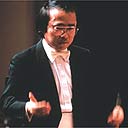
Were Tadaaki Otaka ever to write a book, it might be called Zen and the Art of Orchestral Maintenance. Otaka is conductor laureate of the BBC National Orchestra of Wales, a title reflecting the long and fruitful relationship built up since the mid-1980s and his part in making the orchestra such a well-oiled machine.
In this concert at St David's Hall, Otaka explored the history of orchestration from a French perspective. The journey began in a deceptively slow, almost cautious way with excerpts from Berlioz's dramatic symphony Romeo and Juliet, but by the end of Ravel's second Daphnis and Chloe suite it was a fast and exhilarating ride.
Berlioz was among the first to recognise the art of the conductor in his great treatise on orchestration, and he would surely have appreciated being the starting point of Otaka's journey. The tempo Otaka adopted in the opening Love Scene of Romeo and Juliet was slightly lethargic, but his overall sensitivity to Berlioz's highly atmospheric effects attuned the ear to the expressive quality of sound.
After the interval, the solemn, ritualistic mood of Wagner's prelude to act one of Parsifal didn't up the tempo or dynamic of the evening, prompting reservations about the programme's structure. The performance did, however, clearly underline Berlioz's influence on Wagner, notably in the timbre of the strings and brass. The piece that followed, Takemitsu's Fantasma/ Cantos II, was in turn audibly related to the Wagner, and yet it took one unawares, so stunning was its impact. The austere yet lyrical line of the solo trombone (brilliantly realised by BBCNOW's principal trombonist Mark Eager) created new colours against the glistening sheen of the strings and woodwind.
Otaka's brief pilgrimage in memory of his friend and compatriot had further purpose. Although Takemitsu's mentors were Debussy and Messiaen, his refinement here seemed to be of the same order as that of Ravel in Daphnis and Chloe. Otaka made this series of links in a convincing and unusually satisfying way. And in the high-octane performance of the Ravel, conductor and orchestra came into their own.

